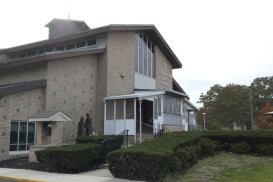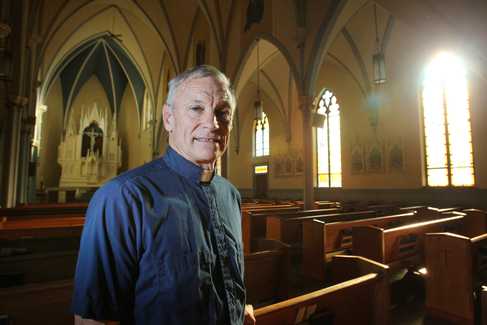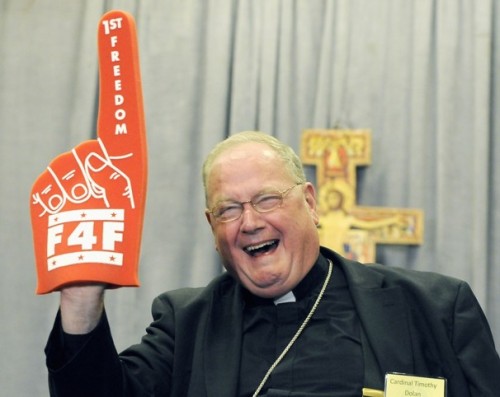
As an aside, the Sisters of St. Francis in Dubuque, Iowa were the spirit-filled women who formed me in grade school at St John Brebeuf Parish in Niles IL. God bless them all.

The Gay Catholic Priests' Blog
Prosecutors in Ocean County have charged a Catholic priest for allegedly making inappropriate sexual contact with a mother and her child.
 Marukudiyil C. Velan, known as “Father Chris” by his parishioners at the Visitation Roman Catholic Church in Brick Township, N.J., touched the alleged victims at their home Saturday, said prosecutors.
Marukudiyil C. Velan, known as “Father Chris” by his parishioners at the Visitation Roman Catholic Church in Brick Township, N.J., touched the alleged victims at their home Saturday, said prosecutors.
Velan, 64, had been assigned to the church as a visiting priest since 2001. The mother told investigators he befriended her family before the alleged incident.
He was arrested Saturday and charged with criminal sexual contact and endangering the welfare of a child.
Velan remains in Ocean County Jail on $75,000 bail, said authorities. Attorney information was not immediately available.
The Diocese of Trenton said Monday it has withdrawn Velan’s ministry privileges while the investigation continues.
“The bishop has pledged the diocese’s full cooperation with this process,” the diocese said in a statement. “Our victims’ assistance coordinator has been made available to those impacted by these troubling allegations, and the diocese will provide whatever support possible.”
Officials from the diocese are asking anyone with information to contact them at 888-296-2965 or at abuseline@dioceseoftrenton.org.
Complete Article HERE!
An Illinois priest forced out of his parish by Belleville’s Catholic bishop for improvising prayers during Mass will no longer be able to preach in public as of today.
 The Rev. William Rowe said Monday that Bishop Edward Braxton has suspended him and removed his “faculties,” or license to practice ministry under church law. The move has been associated in recent years with the punishment of clergy accused of sexually abusing minors.
The Rev. William Rowe said Monday that Bishop Edward Braxton has suspended him and removed his “faculties,” or license to practice ministry under church law. The move has been associated in recent years with the punishment of clergy accused of sexually abusing minors.
Rowe, the pastor of St. Mary Catholic Church in Mount Carmel, Ill., has not been accused of abuse, but he has clashed with Braxton over altering the liturgical prayers of the Roman Missal — the book of prayers, chants and responses used during Mass.
Last month, St. Mary’s parishioners learned that Braxton had officially removed Rowe, their pastor of 18 years. But a separate letter from Braxton recently informed Rowe, 72, that not only would he have to leave the church, but that he could not preach in public anywhere.
Rowe said he could no longer celebrate public Masses or preside at weddings, funerals or baptisms. The only exception, Rowe said, involves a dying person; he can still hear a confession, baptize or anoint that person.
Rowe was scheduled to witness a wedding Saturday — and four others over the summer — but won’t be able to preside. He also will not be able to preside over a funeral Wednesday for an elderly St. Mary’s parishioner.
“That’s very hard for the family,” Rowe said. “I’ll be there, but I can’t participate.”
A spokesman for the diocese, Monsignor John Myler, did not respond to a request for an interview.
According to Catholic liturgical practice, priests are duty bound to the prayers written in the Roman Missal, but Rowe had deviated from the text for decades. He said he did so when the official words didn’t connect precisely with the message he was hoping to convey.
Before a new Vatican-mandated English translation of the Missal was instituted in December, Braxton warned Rowe to stick to the prayers in the Missal. The priest offered Braxton his resignation but later rescinded the offer.
Many of St. Mary’s 500 families have asked Braxton to allow Rowe, who has been pastor there since 1994, to stay. They paid for billboard space near Braxton’s house in Belleville and gathered 1,500 signatures on a petition. Rowe has appealed Braxton’s decision directly to the Vatican.
Rowe, who has been a priest for 47 years, packed up the St. Mary’s rectory Monday afternoon. He’ll move today 45 miles northwest to St. Joseph Catholic Church in Olney, Ill., where he was pastor for four years in the 1980s.
“They’ve welcomed me there,” Rowe said. “I can work as volunteer, play guitar in the school, do Bible study for teens.”
St. Joseph’s pastor, the Rev. Gerry Wirth, said Rowe “doesn’t want to retire.”
“He wants to help people any way he can,” Wirth said. “And we’re ready to give him whatever opportunities are permissible now.”
Complete Article HERE!
Today’s Washington Post reports on a highly troubling story (Arlington Diocese parishioners question need for fidelity oath) about a rising trend in Catholic dioceses to require workers — including volunteers who teach religious education — to affirm some sort of “fidelity oath” in order to continue their work or ministry. The story ends with this:
The Rev. Ronald Nuzzi, who heads the leadership program for Catholic educators at the University of Notre Dame, said many bishops “are in a pickle.” They want Catholic institutions to be staffed by people who not only teach what the church teaches but whose “whole life will bear witness.”
Nuzzi said he keeps a photo on his desk from the 1940s that shows all the German bishops in their garb, doing the Nazi salute.
“I keep it there to remind people who say to do everything the Church says, that their wisdom has limitations, too.”
Anyone who fully understands and values the breadth and depth of Catholic Christianity must be appalled by this trend, especially when such oaths appear to be written in ways that clearly are contrary to Catholic teaching. What is more troubling, however, is the perspective expressed by some — both clergy and laity — who see no problem with such a practice.
Complete Article HERE!
COMMENTARY – Fred Clark
The “Fortnight for Freedom” was a flop.
This was supposed to be a game-changer — the U.S. Conference of Catholic Bishops’ big display of political might. But instead it exposed the bishops as inept campaigners and as generals without an army.

I thought they’d be better at this sort of thing. They had some formidable assets to work with. For weeks ahead of time, Fortnight events were publicized and promoted in every diocese and every parish across the country. And they had some serious money to work with thanks to deep-pocketed (anonymous) donors. They even got a big boost of support from their allies in the evangelical religious right.
But still, it flopped. Big time.
This two-week extravaganza was supposed to redefine the political conversation, but instead it went mostly unnoticed and unattended. It was supposed to show massive grassroots support for the bishops’ contention that allowing women to purchase comprehensive health insurance constitutes an intolerable threat to the religious liberty of employers who wish to prohibit that. But instead it showed, definitively, that there is no grassroots support for that strange argument.
The bishops declared themselves the grand marshals of what was to be a glorious parade, but no one showed up to march behind them and only a meager handful turned out to line the route as spectators.
It was pathetic, really. A bunch of nuns on a shoestring-budget bus tour drew more enthusiasm and more support for their polar-opposite message. For all the millions spent and all the weeks of elaborate, top-down fanfare, the Fortnight for Freedom came and went almost without notice.
“Oh, right, the bishops’ big rally, when is that again? Oh, it happened already? Oh.”
Yawn.
All that time and money invested and almost nothing to show for it.
Part of what we learned here, I think, is that if you’ve got a top-down, hierarchical mentality that regards listening to anyone else as beneath you, as an affront to your righteous authority, then you’re probably not well-suited to rallying grassroots support. When that arrogant mentality shapes your outlook, it seems, you’re probably not even capable of recognizing that you’ve utterly lost all grassroots support.
The bishops did their best to put a happy face on their embarrassing fortnight of failure. “Thousands rally in Washington,” one press release said. And that was true — “thousands” plural because two is a plural number. The largest Fortnight event drew about 4,000 — or, in other words, it was a bit smaller than the crowd at a Bowling Green Hot Rods game on Fireworks Night. (Yes, the Rays’ single-A farm team may outdraw the bishops despite a much-smaller PR budget, yet as far as I know the Hot Rods are not making any claims that this gives them the right to dictate national policy to the president.)
By the end of the fortnight, the affiliated Republican effort “Conscience Clause” had also collected 6,000 signatures for a petition in support of the bishops — or nearly half the number of signatures collected so far in the “Save Pan Am” campaign to get ABC to revive that failed show.
The Fortnight for Freedom was a failure. I suppose, though, that it did succeed in at least one way: providing a handle for plenty of insightful commentary on the bishops’ demands for religious privilege and their increasingly partisan political activism. A sampling of some of that commentary below the jump.
Jessica Coblentz: “Fortnight for Freedom: Whose Religious Liberty?”
In the reaction against Fortnight for Freedom, some are responding to the bishops on their own terms. If the campaign is about religious liberty, they ask, then whose liberty is at stake? The bishops present the Catholic exercise of religious liberty as the ability to reject the use of contraception, or at least the financing of insurance plans that cover contraceptive services. The irony, to those on the other side, is that a campaign meant to promote religious liberty actually denies the religious freedom of many Catholic women, who rely on their personal religious convictions to determine their stance on contraception and the mandate. Studies show that as many as 98 percent of sexually experienced American Catholic women over the age of 18 have used contraception. A recent PRRI/RNS poll reports that a majority of American Catholics do not see the contraception mandate as a threat to religious freedom, indicating that many hold a broader understanding of religious liberty than the bishops maintain. The debate surrounding the mandate, then, is not only about contraception and religious liberty. It is also about who gets to define religious liberty’s very meaning.
… Critics of the bishops’ current battle can call on this Catholic history of religious liberty and individual freedom. In their view, women’s choices are an issue of religious liberty — not merely a threat to it. Still, who defines religious liberty remains a matter of authority — and a highly gendered one at that. When the USCCB conveys that the rejection of contraception is the only religiously-motivated choice that warrants the protection of religious liberty among Catholics, they assert the message that only church leaders have the authority to determine what counts as religious behavior. This strips other Catholics of the legitimate authority to negotiate their tradition when determining their own religiously-motivated actions. What is more, so long as the all-male Catholic clergy solely possess the authority to identify what does and does not constitute a free, religiously-motivated choice worthy of legal protection, women have no official authority in Catholic religious liberty conversations whatsoever. As it stands, the religious decisions and actions of all Catholics other than clergy — be they for or against contraception and contraceptive coverage — are seemingly insignificant in “Catholic” concerns about religious liberty.
… The bishops, or anyone for that matter, need not theologically condone the contraceptive decisions of Catholic women in order to recognize them as exercises of free, religious choice. Yet the current rhetoric of the USCCB’s “Fortnight for Freedom” campaign does not. … If the bishops continue to exclude so many American Catholics from their representation of religious liberty — notably, the majority of Catholic women — the USCCB fails in its own stated aim to protect the religious liberty of all.
Katherine Stewart: “How Corrupt Catholics and Evangelicals Abuse Religious Freedom”
In the writings and speeches of Catholic bishops and evangelical leaders in recent months, “religious freedom” has come to mean something close to its opposite. It now stands for “religious privilege.” It is a coded way for them to state their demand that religious institutions should be allowed special powers that exempt them from the laws of the land.
… This is a war of conquest, designed to expand the power of religious institutions at the expense of the rest of society and the state. It is about carving out an even larger share of the special privileges and exemptions that are already made available only to organized religious institutions.
Such privileges are already substantial. Religions already receive hefty subsidies – by some estimates, as much as $71bn a year – through broad tax exemptions, deductions, and faith-based government programs. A “ministerial exemption” allows them to hire and fire people directly involved in religious activity without regard to anti-discrimination laws.
But they want more. And they are willing to turn the meaning of the word “persecution” on its head to get it.
Sally Rasmussen: “The Bishops on Religious Freedom: ‘We Get More Than You’”
The Catholic bishops have been talking a lot recently about the First Amendment. They’ve made the remarkable claim that their tradition is a source of First Amendment freedoms, but their interpretation of such freedom is that it should shield them from prosecution for collaborating in the sexual abuse of children, at the same time that they are doing their best to deny freedom of religion, speech, and assembly to American nuns. Nor do they believe in freedom of conscience for the Catholic Church which is the people of God – a Church that has thoughtfully concluded that contraception is morally acceptable.
Mark Silk: “Religious Freedom, Becket Style”
I can’t help suspecting that the bishops’ rage against the contraception mandate is actually displaced anger at losing their de facto power to decide the fate of sexually abusive priests.
The real lesson of the conviction of Msgr. William Lynn in Philadelphia last month and the impending trial of Bishop Robert Finn in Kansas City is that if church authorities don’t behave like secular executives when confronted with a subordinate suspected of abuse, then they too will be criminally prosecuted. Archbishop Becket would have considered that an assault on his religious freedom. No one in America can do so anymore, Fortnight or no Fortnight.
Complete Article HERE!